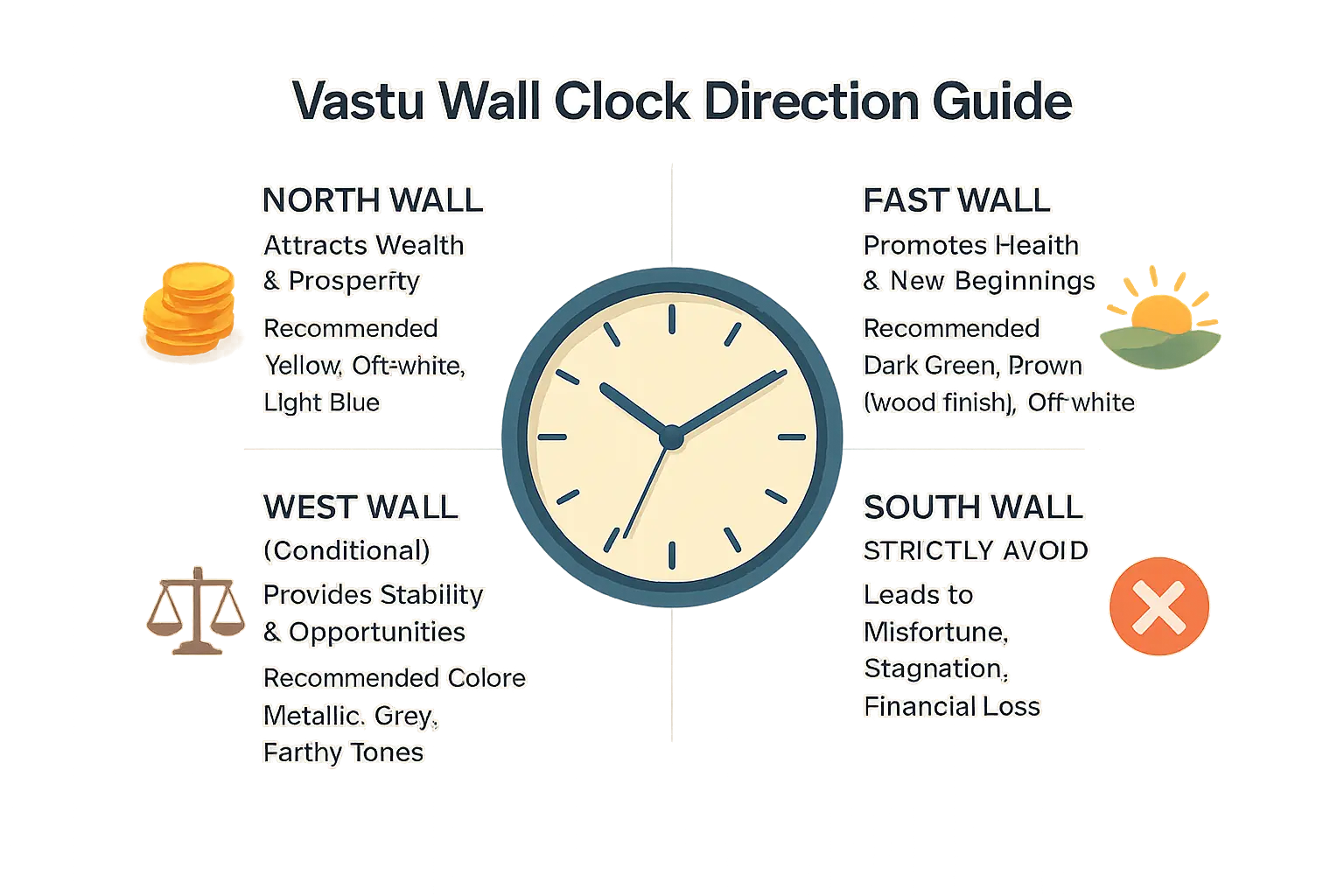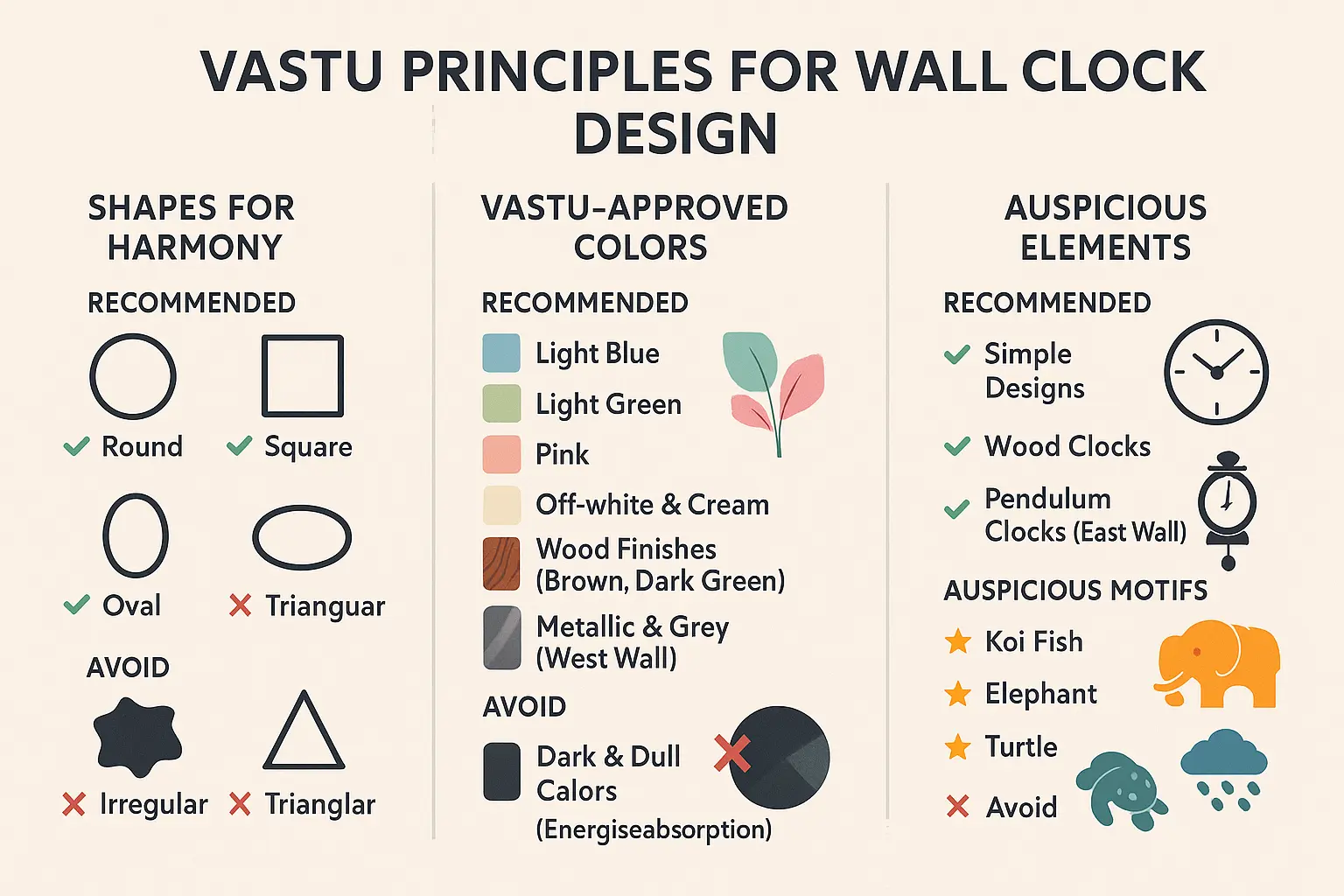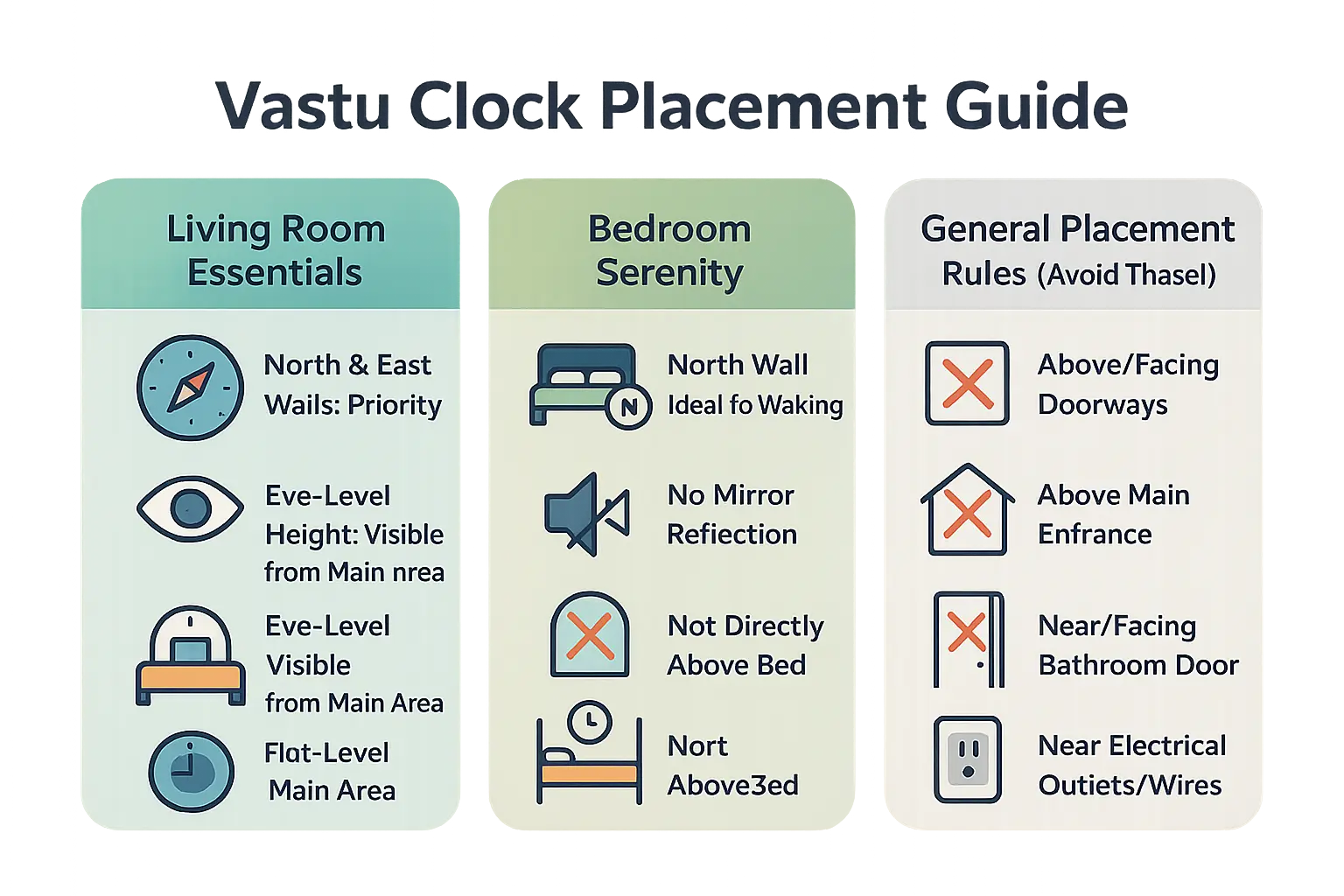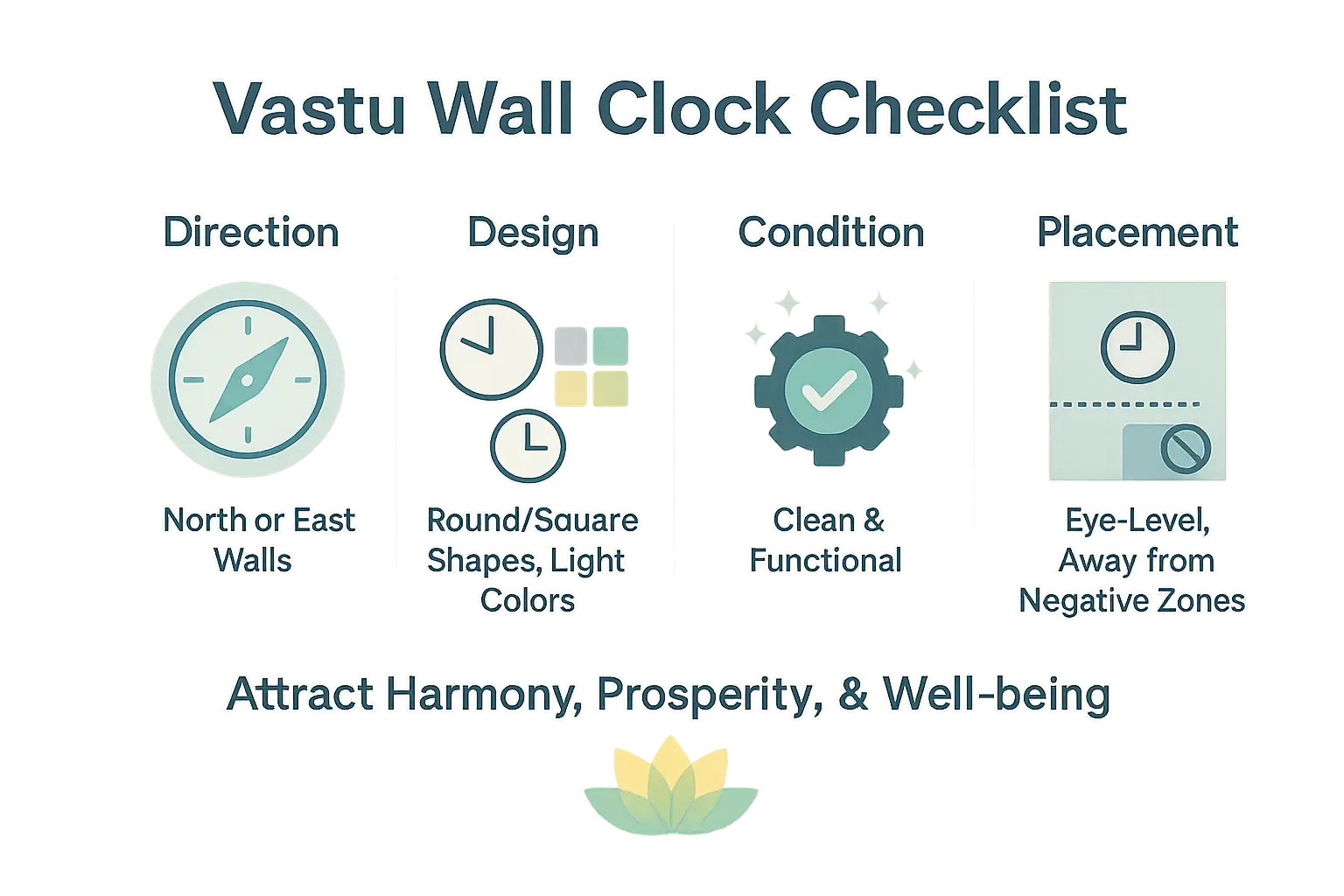Which wall clock is good as per vastu?
The essential to remember: A Vastu-compliant wall clock placed on North or East walls channels prosperity, health, and positive energy. These directions, linked to wealth (Kubera) and renewal (sunrise), optimize life’s flow. Avoid South walls, associated with stagnation to prevent misfortune. A functional, circular clock in light tones amplifies harmony, making it a strategic tool for progress.
Is your wall clock silently draining prosperity from your home? According to Vastu Shastra, a well-placed vastu wall clock channels wealth, health, and progress through strategic directional alignment. Position it on North (abundance zone) or East (renewal realm) walls, prioritize harmonious round/square shapes, and ensure it’s clean and functional to transform timekeeping into a ritual of abundance. Avoid South wall placements tied to stagnation or misfortune. This guide reveals how directional angles, silent pendulum movements, and avoiding broken/dark-toned clocks prevent energy leaks, turning your timepiece into a silent architect of fortune while blocking negative flows.
- Why your wall clock is a powerful vastu tool for positive energy
- The Ultimate Guide to Wall Clock Direction as per Vastu
- Choosing the right design: shape, color, and style
- Vastu Placement Tips For Every Room In Your Home
- The crucial role of clock maintenance and condition
- Unlock advanced vastu insights for your wall clock
- Harmonize your home with the right vastu wall clock
Why your wall clock is a powerful vastu tool for positive energy
The connection between time, energy, and vastu shastra
In Vastu Shastra, every object in a home influences energy flow. A vastu wall clock symbolizes time—a non-renewable resource—making its placement critical. Clocks on North or East walls attract prosperity and health, as these directions align with Kubera (wealth) and Indra (growth). Circular shapes ensure unblocked energy, while functional, clean clocks maintain harmony. A stopped clock signifies stagnation, disrupting progress. Time’s rhythm mirrors life’s balance, turning your clock into a prosperity anchor.
"In Vastu, time is synonymous with the flow of energy. A well-placed and functioning clock ensures a smooth, progressive, and positive flow of energy throughout your home."
What you will learn in this guide
This guide reveals how to optimize your vastu wall clock for prosperity. You’ll discover ideal directions (North/East), shapes (circular/oval), and colors (light tones). We’ll explain why metallic materials suit North walls and wooden designs thrive on East walls. Maintenance tips, like keeping clocks functional and dust-free, will ensure lasting benefits. According to Vastu Shastra, a vastu wall clock must be functional, clean, display accurate time, have circular/oval shapes for positive energy flow, and be positioned on north/east walls to attract prosperity.

The Ultimate Guide to Wall Clock Direction as per Vastu
Ideal Directions for Attracting Wealth and Health
According to Vastu Shastra, the north wall is associated with Kubera, the deity of wealth. Placing a wall clock here attracts financial prosperity. This direction aligns with positive energy that enhances monetary gains. The north corresponds to the water element in Vastu, symbolizing flow and abundance, making it auspicious for wealth.
The east wall corresponds to Indra, the king of celestial beings, and represents the rising sun. A wall clock in this direction promotes good health, encourages new beginnings, and brings positive energy to the household. The east direction relates to the air element, supporting physical well-being and fresh opportunities. Pendulum clocks work well for east-facing walls as their motion enhances energy flow.
Directions to Strictly Avoid for a Harmonious Home
The south wall is governed by Yama, the god of death, making it the most unfavorable direction for a wall clock. Vastu experts warn that placing a clock here might lead to misfortunes, family health issues, and professional obstacles. This direction relates to the heavy earth element, potentially causing slow progress.
The southwest and southeast directions are considered inauspicious for clock placement. These areas disrupt energy flow and disturb the home's balance. The southwest direction, ruled by demons according to Vastu, is associated with negativity, while the southeast direction governed by Agni creates imbalance with clocks.
Using the West Wall: a Conditional Option
Generally discouraged, the west wall can serve as a last-resort location for a wall clock. This direction relates to stability and potential opportunities. If chosen, use metallic, grey, or earthy tones to harmonize with the wall's energy. The clock should be at eye level, visible from key areas, and avoid dark colors that absorb positive vibrations.
| Direction | Associated Benefits/Effects | Recommended Clock Colors |
|---|---|---|
| North | Attracts wealth and prosperity | Yellow, Off-white, Light Blue |
| East | Promotes health and new beginnings | Dark green, Brown (wood finish), Off-white |
| West (Conditional) | Provides stability, gain in opportunities | Metallic, Grey, Earthy tones |
| South | To be avoided. Stagnation, misfortune, financial loss | N/A (Do not place a clock here) |


Choosing the right design: shape, color, and style
The best shapes for balance and harmony
Vastu Shastra emphasizes geometric harmony to optimize energy flow. Circular, oval, and square clocks with smooth edges are ideal, symbolizing continuity and stability. These forms align with the elemental balance—circular shapes represent space, while squares embody earth energy. Triangular clocks should be avoided entirely, as their sharp angles symbolize fire, potentially introducing conflict and disharmony.
For directional alignment:
- Rounded clocks work best for North or East walls (wealth and growth)
- Rectangular shapes with softened corners are acceptable for West walls (stability)
- Avoid asymmetrical or jagged designs in all locations
Vastu-approved colors for your wall clock
Color choices should match both directional energies and functional needs. Light, soothing tones like sky blue, soft green, and pastel pink create tranquility, while metallic shades (silver, gunmetal gray) suit West walls governed by water energy. Wood tones like dark green or brown enhance East wall placements linked to health and new beginnings.
Direction-specific recommendations:
| Wall Direction | Recommended Colors |
|---|---|
| North | Blue, silver, light green |
| East | Wood tones, off-white, yellow |
| West | Metallic, gray, pale white |
Dark shades like black or navy should be avoided as they absorb positive energy. Cracked or faded finishes require immediate repair to maintain energetic integrity.
Auspicious motifs and materials
Material selection matters: solid wood brings natural warmth, while metal frames offer stability. Pendulum clocks placed on East walls create favorable energy waves through their rhythmic motion. Decorative motifs should convey positivity through culturally significant symbols:
- Koi fish designs – Symbolize abundance and success
- Decorative elephants – Represent strength and auspicious beginnings
- Feng Shui turtles – Offer protection and longevity
- Evil Eye patterns – Ward off negative energies
Avoid war imagery, sorrowful scenes, or abstract shapes that disrupt energetic flow. For prayer rooms, simple Om or Swastik motifs in pastel tones maintain sacred space integrity. All clocks must remain fully functional – broken glass or incorrect time display negates Vastu benefits entirely.
Vastu Placement Tips For Every Room In Your Home
In The Living Room: The Heart Of Your Home

Strategically position clocks on North or East walls in living rooms to channel prosperity and positive energy. These directions align with Kubera (wealth) and Indra (progress), creating optimal conditions for abundance. Optimal designs feature circular or oval shapes that promote positive energy flow. For North walls, metallic materials like brass or silver enhance wealth vibrations, while East walls benefit from wooden frames that symbolize growth.
Mount clocks at eye level for effortless visibility from seating areas. This placement ensures timekeeping doesn't disrupt energy flow while maintaining practical functionality for gathering spaces. Light-colored finishes like cream or pale blue on clock faces further enhance tranquility in social zones.
In The Bedroom: Ensuring Restful Energy
Select silent clocks for bedrooms to preserve tranquil atmospheres. North walls provide ideal positioning for morning visibility, while East walls offer secondary benefits for sleep quality improvement. Choose oval-shaped clocks to maintain harmonious energy patterns, and ensure the clock face remains unobstructed by dust or decor elements to maintain accurate timekeeping.
Avoid mirror reflections by checking angles carefully. Never install clocks directly above beds - this creates oppressive pressure disrupting restful energy according to Vastu principles. Prioritize clocks with soft ticking mechanisms to prevent sleep disturbances.
General Placement Rules To Always Follow
Prevent energy blockages by following these crucial placement guidelines:
- Never position clocks directly above or facing doorways
- Avoid main entrance door placements to maintain unobstructed energy pathways
- Exclude exterior wall installations which expose clocks to environmental disruptions
- Keep clocks from aligning with bathroom doors to prevent energy contamination
- Maintain distance from electrical outlets and exposed wiring for safety and energy harmony
Regular maintenance proves equally crucial - wipe clock surfaces weekly and immediately replace batteries to prevent stagnant energy. Remember, a stopped clock symbolizes halted progress, while a consistently functioning timepiece reinforces continuous prosperity. Maintain perfect alignment by checking clock accuracy monthly and dusting mechanisms to ensure smooth operation.
The crucial role of clock maintenance and condition

Why a stopped clock means stagnant energy
According to Vastu Shastra, a non-functional clock symbolizes halted progress. A stopped or lagging clock reflects stagnation in personal growth, career, and financial prosperity. This stems from ancient associations where halting clocks marked moments of death, linking inactivity to negative energy. Time itself is sacred in Vastu philosophy—when a clock stops, it disrupts this energy’s natural rhythm, potentially attracting obstacles in life.
A broken or stopped clock doesn’t just fail to tell time; in Vastu, it actively generates negative energy, symbolizing a halt in your progress and prosperity.
Essential maintenance for positive vibes
To align with Vastu’s energy flow principles, follow these actionable steps:
- Keep the clock clean and dust-free to maintain a clear flow of positive energy.
- Ensure the clock displays the correct time, or one to two minutes ahead to encourage punctuality and progress. Never let it run late.
- Immediately repair or remove clocks with cracked or broken glass. Damaged surfaces create subconscious anxiety that contradicts Vastu’s emphasis on mental clarity.
- Regularly check and replace batteries or wind mechanical clocks to ensure continuous operation.
A functional clock mirrors a dynamic life. Cracked glass or delayed timekeeping disrupts harmony, while consistent maintenance reinforces momentum in personal and professional spheres. Prioritize metallic finishes like brass or copper for durability and energy alignment, avoiding synthetics that degrade faster. Place clocks in visible yet non-intrusive locations—avoid direct alignment with beds or workspaces to prevent subconscious pressure. A well-maintained clock’s ticking becomes a subtle rhythm harmonizing with the home’s energy, transforming timekeeping into a spiritual practice.
Unlock advanced vastu insights for your wall clock
Gifting a clock: vastu do's and don'ts
According to Vastu Shastra, gifting clocks carries unique energetic implications. Offering a wall clock may inadvertently transfer positive time energy to the recipient, potentially impacting relationships. A symbolic solution? Exchange a small coin or token alongside the gift to "purchase" time back, neutralizing negative vibrations.
Avoid gifting clocks to elders, as beliefs associate this with shortening lifespan. If receiving a Vastu-compliant clock, ensure it displays accurate time and features auspicious design elements like metallic finishes or wooden accents. Prioritize circular/oval shapes for smooth energy flow, aligning with North/East placement principles.
Does the style of numerals matter in vastu?
While classical Vastu texts don't specify numeral styles, clarity emerges as crucial. Prioritize clocks with legible Arabic numerals over abstract designs or numeral-free dials. Analog clocks with visible moving hands outperform digital displays in maintaining positive energy flow.
Opt for uncluttered faces with balanced number spacing. Though not explicitly forbidden, Roman numerals work best when symmetrical and proportionate. Avoid excessively decorative fonts that disrupt visual harmony, as clear time visibility remains essential for maintaining synchronized energy patterns in living spaces.

Harmonize your home with the right vastu wall clock

Your checklist for a perfect vastu clock
Transform your space with a Vastu-compliant wall clock. This simple object channels prosperity when placed correctly. Focus on these four essentials:
Direction: Prioritize North (wealth, Kubera) or East (health, Indra). Avoid South/West walls as they disrupt energy flow, causing setbacks.
Design: Choose circular or oval shapes for smooth energy cycles. Use light colors like cream or soft blue. Metallic finishes suit North walls; wooden frames work for East placements.
Condition: Ensure flawless functionality. Clean regularly, set 1-2 minutes ahead to encourage progress. Replace clocks with cracked glass, faded numbers, or broken mechanisms immediately.
Placement: Mount at eye level. Avoid bathrooms, mirrors, or main doors. In bedrooms, position North or East for visibility from the bed, but avoid direct line-of-sight.
Each tick reinforces positive energy. Follow this checklist to align your home with prosperity and harmony, turning time into a tool for growth.
A well-placed Vastu wall clock channels prosperity and harmonious energy. Prioritize North/East walls for wealth and vitality; choose round/square designs in light tones for balance; ensure flawless functionality. Avoid South/West walls to prevent stagnation; position clocks at eye level, away from negative zones. Following these principles transforms your clock into a magnet for progress, stability, and well-being.
FAQ
What are the ideal characteristics of a Vastu-compliant wall clock?
A Vastu-compliant wall clock should be placed on the north or east walls to attract prosperity and health. Opt for round, square, or oval shapes symbolizing harmony, and use light, calming colors like pastel blues, greens, or off-white. Avoid dark or dull tones, irregular/triangular designs, and ensure the clock is functional, clean, and displays accurate time. Auspicious motifs like koi fish or elephants are recommended, while war or sorrow imagery should be avoided.
How does Vastu Shastra view the symbolic role of clocks in a home?
Vastu Shastra sees clocks as representations of time’s energy flow. A well-placed clock ensures progressive, positive energy, while broken or misaligned clocks create stagnation. Clocks on north walls (governed by Kubera, god of wealth) enhance prosperity, while east walls (Indra’s domain) promote health. The direction and condition of the clock directly influence family well-being, career growth, and financial stability.
Is gifting a wall clock considered auspicious in Vastu traditions?
Gifting a wall clock is generally discouraged in Vastu traditions, as it symbolizes "giving away time," potentially straining relationships. If gifted, advise the recipient to offer a small token (like a coin) in return to neutralize negative energy. Ensure the clock adheres to Vastu principles (e.g., favorable direction, auspicious design) to maintain its positive symbolism.
Which placements should be strictly avoided for wall clocks according to Vastu?
Avoid placing clocks on south walls (governed by Yama, god of death), as they invite stagnation and misfortune. Steer clear of south-west and south-east walls, west walls (unless used as a last resort with metallic tones), and areas near mirrors, bathrooms, or electrical outlets. Do not hang clocks above doorways, main entrances, or in bedrooms directly facing beds to prevent disrupted sleep and energy imbalances.
What is the most inauspicious direction for a wall clock?
The south direction is the most unfavorable for wall clocks. Placing a clock here may cause health issues, financial losses, and career obstacles. This direction, linked to Yama, disrupts positive energy flow. If unavoidable, prioritize north, east, or cautiously use west walls with metallic/earthy tones for stability.
Are Roman numeral clocks acceptable under Vastu guidelines?
Roman numeral clocks are acceptable if their design ensures clarity and symmetry. Prioritize numerals that are easy to read, avoiding overly stylized or obstructed arrangements. While not strictly prohibited, ensure the numerals align with Vastu’s emphasis on balance—opt for harmonious layouts over abstract or cluttered designs.
What are the key placement rules for wall clocks in a home?
Mount clocks on north or east walls for optimal results. Place them at eye level for visibility and ensure they’re unobstructed. Avoid positioning clocks facing doorways, bathrooms, or exterior walls. In bedrooms, choose north or east walls, keep clocks silent, and prevent mirror reflections. Maintain a distance from electrical appliances and ensure clocks are always functional.
What factors should guide the selection of a wall clock?
Select clocks with round/square shapes, light colors (pastels, metallics), and auspicious motifs like koi fish or elephants. Avoid triangular or irregular designs. Prioritize mechanical clocks with smooth movements over noisy ticking ones. Ensure the clock’s size matches the wall and its numerals are clear and unobstructed for a balanced aesthetic.
How does Feng Shui influence clock placement in a home?
Feng Shui complements Vastu by discouraging clocks in bedrooms (to preserve calm) and direct alignment with doorways. While Vastu emphasizes north/east directions, Feng Shui advises against clocks facing beds or creating visual dominance. Both traditions agree on avoiding broken or loud clocks to maintain serene, unobstructed energy flow.
While choosing a wall clock that aligns with Vastu enhances balance and prosperity in your home, it’s equally intriguing to explore what it means when time itself seems to pause, discover here what happens when clocks stop.
